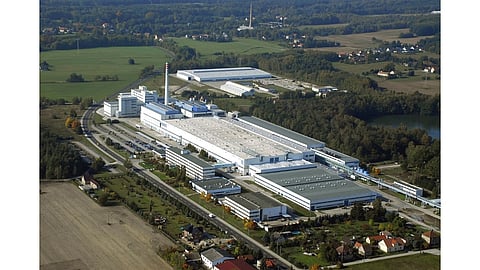

GMB Glasmanufaktur Brandenburg is reportedly planning to apply for short-time work in Germany
The move comes in times of reduced demand and growing competition from the Chinese
The company’s majority owner Borosil recently said GMB’s operations are running at only about 40% of the production
GMB Glasmanufaktur Brandenburg GmbH (GMB), the only solar glass manufacturer in Europe based out of Germany, is applying for short-time work for its staff as it faces reduced demand amidst competitively priced products from the Chinese.
Short-time work allowance or Kurzarbeitergeld in Germany refers to reduced working hours and reduced pay for the staff. It is a benefit allowed by the government to support businesses and employees during temporary economic downturns. GMB has announced short-time work, according to local news portal Lausitzer Rundschau.
GMB is part of the Interfloat Group which is majority owned by Indian solar glass manufacturer Borosil Renewables since October 2022. While Borosil owns 86% shares in the company, the Blue Minds Company owns the remaining shares.
Recently on a conference call with analysts to share the the company’s Q2 FY’25 (period ending September 30, 2024) financial results, Borosil’s Whole-Time Director Ashok Jain said the company’s German operations face significant challenges due to reduced demand. The local demand is only about 40% of the production.
Though it has been operating the German plant at a high rate of utilization due to orders from the US and European Union (EU), these are priced low. The orders remain insufficient since customers in the US are still ramping up and demand in adjacent market is still low.
“The steps taken by the European Union to support domestic manufacturing of modules have been adopted by France, Italy and Austria. It will take time for the demand from these countries to make a meaningful difference to the overall demand. Germany in the meanwhile has kept this matter under consideration,” stated Jain.
Lack of any protection for module manufacturers in Germany or the EU, neither in terms of the Basic Customs Duty (BCD) nor antidumping, has pulled down demand in the market as several customers are now out of business.
He also added that the company is not looking at outsourcing manufacturing in Germany as of now due to higher costs in Europe.
Meanwhile, in India Borosil continues to see the market picking up. It recently announced plans to expand its production capacity by 500 tons per day (TPD) to 1,500 TPD on the back of increasing demand for solar glass in India. The decision followed the Indian Finance Ministry announcing a reference price for imports to curb cheap and dumped imports from China and Vietnam (see Borosil Renewables To Expand Manufacturing Capacity By 50%).
Referring to the GMB’s short-time work arrangement, Gunter Erfurt, the former CEO of Meyer Burger, called it a failure on part of Germany that does not do much in terms of policy to support the local industry to compete with highly subsidized Chinese products. “Solar is the new oil and we are 100% dependent on China. In short: madness!” he stated in a LinkedIn post.
Responding to Erfurt’s post was Borosil Renewables Chairman Pradeep Kheruka who hoped the new German government will provide a clear policy direction for the future of a domestic production capability of renewable energy equipment.
